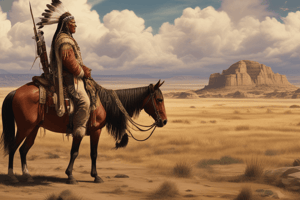Podcast
Questions and Answers
What is a significant goal for many Native American tribes?
What is a significant goal for many Native American tribes?
- To adopt Western cultural practices
- To preserve and revitalize their unique cultures and languages (correct)
- To increase urbanization within tribes
- To entirely abandon traditional practices
Political and legal struggles for tribal self-determination are considered unimportant by many Native American tribes.
Political and legal struggles for tribal self-determination are considered unimportant by many Native American tribes.
False (B)
Name one integral part of Native American cultures that connects the community with its past.
Name one integral part of Native American cultures that connects the community with its past.
ceremonies, rituals, dances, or storytelling
Traditional Native American crafts, such as __________, are deeply rooted in their cultures.
Traditional Native American crafts, such as __________, are deeply rooted in their cultures.
Match the environmental concerns with their implications for Native American tribes:
Match the environmental concerns with their implications for Native American tribes:
Which of the following civilizations was NOT one of the prominent Native American empires?
Which of the following civilizations was NOT one of the prominent Native American empires?
European colonization had no impact on the population of Native Americans.
European colonization had no impact on the population of Native Americans.
What significant events occurred as a consequence of European colonization for Native Americans?
What significant events occurred as a consequence of European colonization for Native Americans?
The _____ were known for their advanced civilizations in Mesoamerica.
The _____ were known for their advanced civilizations in Mesoamerica.
Match the following impacts of colonization with their descriptions:
Match the following impacts of colonization with their descriptions:
What was a common result of policies aimed at cultural assimilation of Native Americans?
What was a common result of policies aimed at cultural assimilation of Native Americans?
Name one major disease that significantly affected Native American populations.
Name one major disease that significantly affected Native American populations.
Despite their rich cultural histories, Native Americans currently do not face economic challenges.
Despite their rich cultural histories, Native Americans currently do not face economic challenges.
Flashcards
Cultural Revitalization
Cultural Revitalization
Efforts made by Native American tribes to preserve and bring back their unique cultures and languages, often after periods of suppression.
Tribal Self-Determination
Tribal Self-Determination
The right of Native American tribes to govern themselves and make decisions about their own affairs, free from outside interference.
Environmental Concerns on Reservations
Environmental Concerns on Reservations
The challenges faced by Native American tribes in protecting their lands and resources, often due to limited funding and access to policies.
Cultural Expression in Arts
Cultural Expression in Arts
Signup and view all the flashcards
Traditional Knowledge of Nature
Traditional Knowledge of Nature
Signup and view all the flashcards
Native American Cultures
Native American Cultures
Signup and view all the flashcards
European Arrival's Impact
European Arrival's Impact
Signup and view all the flashcards
Cultural Disruption
Cultural Disruption
Signup and view all the flashcards
Disease Epidemics
Disease Epidemics
Signup and view all the flashcards
Land Loss & Displacement
Land Loss & Displacement
Signup and view all the flashcards
Assimilation Policies
Assimilation Policies
Signup and view all the flashcards
Ongoing Land Disputes
Ongoing Land Disputes
Signup and view all the flashcards
Contemporary Challenges
Contemporary Challenges
Signup and view all the flashcards
Study Notes
Native Americans
- Native Americans, also known as Indigenous peoples of the Americas, are incredibly diverse, with a multitude of cultures and languages.
- They have inhabited the Americas for thousands of years, developing sophisticated societies and traditions across various regions.
- These societies encompassed hunter-gatherer, agricultural, and advanced civilizations, including notable empires like the Inca, Maya, and Aztec. Each had its own unique political structures, social hierarchies, and spiritual beliefs.
Historical Impacts of Colonization
- European colonization, beginning in the 15th and 16th centuries, significantly altered the lives of Native Americans.
- Disease outbreaks, like smallpox, measles, and influenza, decimated populations due to a lack of immunity.
- The forceful displacement from ancestral lands, often through land confiscations and forced removals, broke treaties and ignited conflicts, profoundly impacting their way of life.
- Policies aimed at cultural assimilation, which often involved prohibiting traditional practices and languages, led to the erosion of cultural identity.
- The ongoing legal and political challenges stemming from land ownership disputes and resource rights continue to impact Native American communities.
Contemporary Issues
- Native Americans face significant challenges, including poverty, limited access to healthcare, education, and economic opportunities, often lagging behind national averages.
- Many tribes are actively working to preserve and revive their unique cultures and languages. Their efforts to maintain traditions are particularly crucial in areas where they have been suppressed.
- Struggles for tribal self-determination and sovereignty are key to addressing systemic disparities.
- Environmental concerns on reservations, including inadequate environmental protection and resource management, remain critical issues, exacerbated by limited resources and access to adequate policies.
Cultural Significance
- Native American art, music, and literature reflect their complex history and diverse cultures. Their stories, emotions, and spiritual beliefs are vividly expressed through art forms transmitted across generations.
- Ceremonies, rituals, dances, and storytelling traditions are deeply integral to Native American cultures, linking communities with their past.
- Traditional crafts (pottery, weaving, beadwork) are crucial to their cultural identity and remain vital art forms.
- Indigenous knowledge of plants, animals, and the environment, which played a crucial role in their societies, continues to endure and inform practices in some communities.
Studying That Suits You
Use AI to generate personalized quizzes and flashcards to suit your learning preferences.




